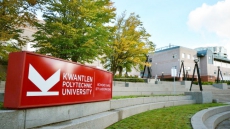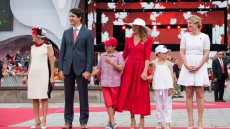VANCOUVER — The lawyer for a senior executive of Chinese tech giant Huawei who was arrested in Canada on a U.S. extradition warrant said Wednesday he'll try to prevent the case from going ahead by arguing that comments by President Donald Trump suggest the case against her is politically motivated.
Attorney Scott Fenton referred to Trump during a court appearance by Huawei CFO Meng Wanzhou and her lawyers, saying they would be requesting a stay in proceedings. Canada arrested Meng, the daughter of Huawei's founder, on Dec. 1. She is wanted in the U.S. on fraud charges.
The U.S. and China have tried to keep Meng's case separate from their trade dispute, although Trump has said he would consider intervening in the case if it would help forge a trade deal with Beijing.
Fenton called Trump's comments "intimidating and corrosive of the rule of law."
Meng's lawyers will also look for a stay in the proceedings by saying she was searched and interrogated before being told she was under arrest.
Meng is accused of lying to banks about the company's dealings with Iran in violation of U.S. trade sanctions. Her lawyers also say they will argue that what she is alleged to have done is not a crime in Canada.
She is free on bail in Vancouver and asked the court Wednesday if she could live in her larger Vancouver multimillion-dollar home that recently underwent a renovation. A judge granted her request and the judge also ruled she'll hear arguments on evidence disclosure in late September and October. A decision on whether she is extradited to the U.S. could take years.
Meng's lawyers previously said Trump "has repeatedly stated that he would interfere in Ms. Meng's case if he thought it would assist the U.S negotiations with China over a trade deal."
Her arrest at the Vancouver airport set off a diplomatic furor that has had led to the worst relations between Canada and China since the Tiananmen Square massacre in 1989.
China detained former Canadian diplomat Michael Kovrig and Canadian entrepreneur Michael Spavor on Dec. 10 in an apparent attempt to pressure Canada to release Meng. Kovrig and Spavor haven't had access to a lawyer since being arrested.
A Chinese court also sentenced a Canadian to death in a sudden retrial on allegations of drug trafficking, overturning a 15-year prison term handed down earlier. China is also blocking imports of the agricultural product canola from Canada.
Huawei is a focus of U.S. security concerns. Washington has pressured other countries to limit use of its technology, warning they could be opening themselves up to surveillance and theft of information.
Outside the court, protesters called for the release of the two detained Canadians and protested China's internment of an estimated 1 million Uighurs (WEE-gurs).




